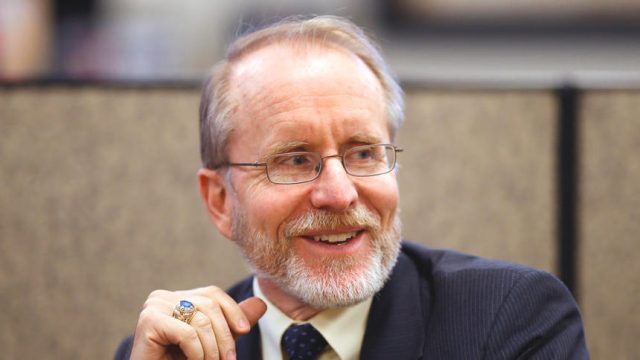Higher Ed Is Already Run by Politicians, They Just Don’t Have to Stand for Election

FILE PHOTO: Chancellor Mark Hagerott of the North Dakota University System. ( Eric Hylden/Grand Forks Herald)
In North Dakota talk often turns to better ways to govern our sprawling university system. Because that university system is often plagued with scandal.
But when it does, you can expect some blinkered defender of the status quo to start talking about how universities ought not be politicized. Then the abuses of a North Dakota governor from going on a century ago will be invoked as a magical talisman warding off reform.
Case in point, former Democratic Lt. Governor Lloyd Omdahl’s most recent column. In addressing the most recent headaches from the North Dakota University System – those surrounding chronically thin skinned Chancellor Mark Hagerott – argues that the university system is a “fourth branch of government.”
“The Legislature has spent decades trying to make the board give up its constitutional independence and bow to its political impulses,” he writes.
Then he tells the old saw about Governor “Wild” Bill Langer who in 1933 tried to force university employees to buy subscriptions to his political newspaper. They weren’t having it, so in retaliation the governor fired the head of North Dakota State University and some others. It didn’t go over well. The upshot was a constitutional amendment which really did turn the university system into a sort of fourth branch of government.
[mks_pullquote align=”right” width=”300″ size=”24″ bg_color=”#ffffff” txt_color=”#000000″]But where Omdahl heralds that as good reform, the truth is it was an overreaction. Langer’s abuses were a problem with Langer, not the concept of political accountability for the university system.[/mks_pullquote]
But where Omdahl heralds that as good reform, the truth is it was an overreaction. Langer’s abuses were a problem with Langer, not the concept of political accountability for the university system.
The three other branches of our state government are all elected of the people. Lawmakers and the governor must face voters every four years. Our state Supreme Court justices must face re-election every ten years.
We regard this political accountability as right and proper, but for some reason we’re supposed to see the universities not only as a “fourth branch of government” but beyond accountability to the taxpayers? Or even accountability to some elected leader who is, in turn, accountable to the people?
To be sure, political accountability is no panacea. I suspect that even if the universities were accountable to our political leaders we’d still see a struggle to prioritize academics over big-time athletics at our largest campuses. We’d still see the parochialism which prioritizes campus and budget expansion over useful, cost-effective academic outcomes for students.
But at the very least, when some university president or chancellor goes off the rail, someone like the governor would have not just the impetus but the authority to step in and be a grownup in the room.
Because the truth is that our university system is home to some of the most vicious politics in our state. The only difference between the campuses and the halls of the state capitol is that the denizens of the former needn’t worry about re-election while those of the latter do.
That’s a problem which needs fixing.
The State Board of Higher Education ought to be appointed by, and serve at the pleasure of, our Governor. And when things go wrong in the system, it ought to be the Governor who feels the heat.




